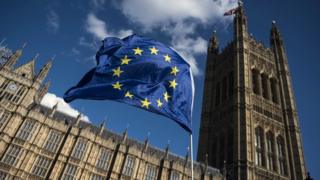 Image copyright
EPA
Image copyright
EPA
The UK government is to publish a White Paper outlining its future relationship with the EU ahead of June's key summit.
Next month's publication will extend to more than 100 pages and will involve reaching agreement with almost every government department.
A cabinet source told the BBC it would "allow the UK to go and actually negotiate".
Labour said it was "deeply disturbing" that ministers "still cannot agree on the most fundamental Brexit issues".
BBC political editor Laura Kuenssberg said the Brexit Department had been pushing for the White Paper - a type of policy document - for some time, but was only able to secure agreement from Number 10 and the rest of the cabinet at a meeting earlier on Tuesday.
Many subjects, including aviation, financial services and fisheries are expected to feature.
The UK is due to leave the EU in March 2019, but ministers have not yet agreed how to replace the current membership of the customs union, which allows for tariff-free trading between members.
Earlier the group of senior ministers on the Brexit sub-committee met to discuss the government's two proposals - a customs partnership with the EU, and the use of technology to minimise border checks.
The partnership arrangement - which is believed to be Theresa May's preferred option - has been strongly criticised by Brexiteers including Foreign Secretary Boris Johnson.
There is still no firm decision on which option to choose, but several cabinet ministers had acknowledged privately there could be an extension of the UK's customs union membership to give time for a solution to be developed, Laura Kuenssberg added.
In February, the government published a Brexit White Paper after pressure from Labour.
Responding to news of the new publication, shadow Brexit minister Paul Blomfield said: "Ministers have finally agreed to publish a White Paper on the government's negotiating position, but they still don't know what it will say."
Mr Blomfield said ministers had "wasted months arguing amongst themselves rather than negotiating in the national interest".